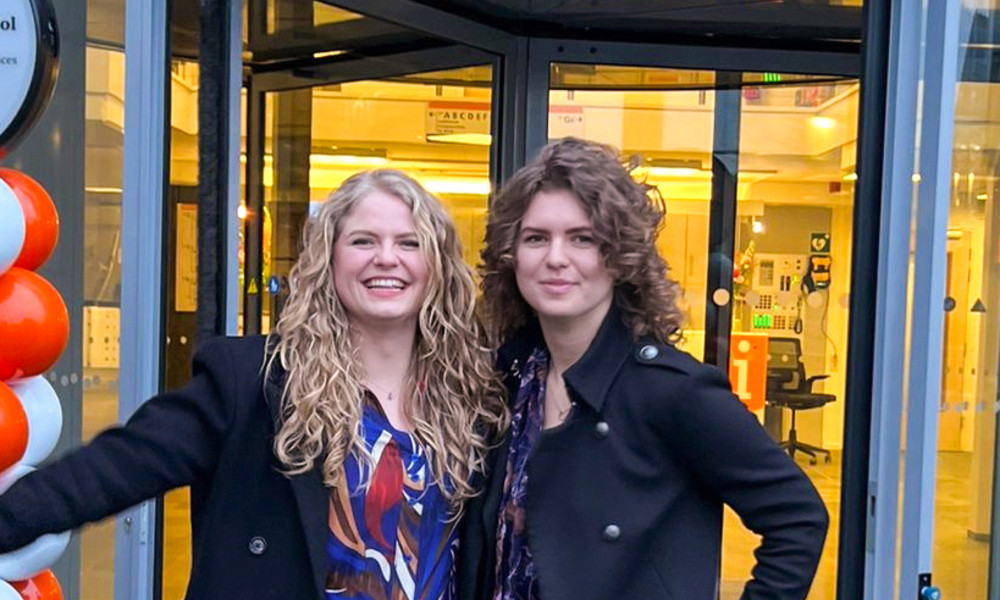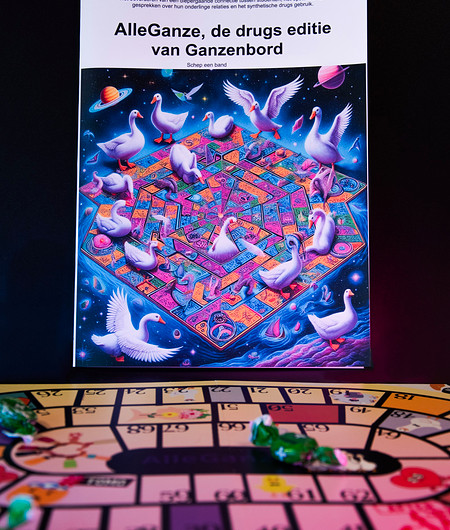Game of the goose: having a chat about drug use
- News


"You've been caught in possession of drugs by festival security. You have to pay the fine, go back to number 27.' For their thesis, Yana Brakel and Marije Hendriks developed Alleganze, the drug edition of the traditional board game Game of the Goose.
Text: Loes Vader
Yana Brakel and Marije Hendriks are both graduates of the bachelor's programme Applied Psychology. Their graduation research was part of the project Pilletje here, pilletje daar of the Living Lab Zorg en Veiligheid (Care and Safety) of the Addiction Studies and Forensic Care research group, an initiative of the Public Prosecution Service that aims to involve young people in discussing the social impact of drugs.
"We have noticed in our environment that drug use is becoming more and more normal and that students are using more and more," Yana explains. "We also saw the incident during Business Administration introduction camp, where chaos broke out due to drug use. I live in Uithuizen and there I also see that the drug runners that are being recruited are getting younger and younger. We have looked into how we can help students make more conscious choices about drugs and alcohol."
Without moralising, norming or blaming, Yana and Marije wanted to involve young people in discussing the social impact of drugs. They would like to "enter into the conversation openly, without any finger-wagging. We wanted to develop a tool to stimulate that, something tangible. Through focus groups, we used design thinking, a method to create something in a more imaginative way, and entered into a dialogue with the target group." During that process, the researchers figured out that a game might work. "We discovered that feeling connected to each other is often the reason behind drug use. While they doubt whether connection through drugs is genuine. We checked this in the literature and found that 98 percent of drug-using students do so in social settings. Board games also contribute to relaxation and strengthen mutual connections. So that fits in seamlessly with what we want to achieve. So we also see Alleganze as an alternative to an evening on drugs," says Yana.
You can play Alleganze with two to six people. Just like in regular Game of the Goose, you roll a dice and your pawn moves around the board accordingly. While playing, you ask each other personal questions. The game contains about 150 questions, which the researchers have also substantiated. Yana gives a few examples. "Who in your circle of friends do you feel most comfortable with and why? Have you ever felt pressure to use drugs at a party, and how did you deal with it? Do you think happiness can be created? In addition, we have added special boxes. For example, you get to square 58 FOMO: you are staying at home for the evening and you are suffering from FOMO, go to the pawn that is closest to you. The pawns are in the shape of a pill, a barrel of drug waste or a bottle."
Yana and Marije dream of the day that the game will be made available in stores everywhere so that everyone will be able to play the game. "At the moment there are four copies. The next steps are: are we going to do further research, are we going to perfect and test it and how can we start producing it? Last week I spoke with Dick Pouwels (President of the Executive Board) of the Hanze and he would
like to publish it for first-year students next year. Of course, that would be great. They are new to student life and would be able learn how to talk about their alcohol and drug use straight away."
We played the game ourselves a number of times in the focus groups. Petrick Glasbergen and Arne van den Bos from the research group played it. I played it with friends and also with my best friend, whom I have known for eight years. We all noticed that the conversations went deeper. I discovered new things about my best friend and her view of life and how she sees certain things. I think that's very special," Yana emphasises.
How satisfied are you with the information on this page?